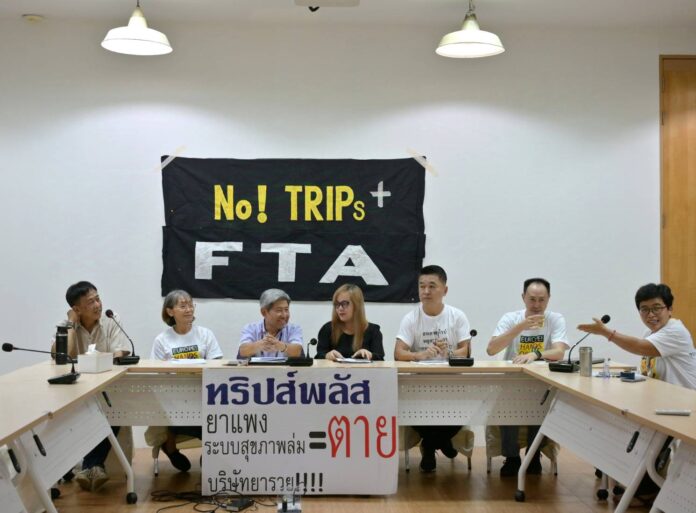Grave concerns over expensive medicines, the universal health coverage scheme at risk, unsafe second-hand medical devices, farmers’ increasing debts & biopiracy, and commercial determinants of health.
25th November 2024, Bangkok: On the occasion of Thailand hosting the 4th round of Thailand – European Union Free Trade Agreement’s negotiation, which is held on the 25th – 29th November in Bangkok, Thai civil society networks, including FTA Watch, the Thai Network of People Living with HIV/AIDS, the Alternative Agriculture Network, the Thailand Consumers Council, and an academic group, held a press conference to express their serious concerns over the FTA’s adverse impact on the public.
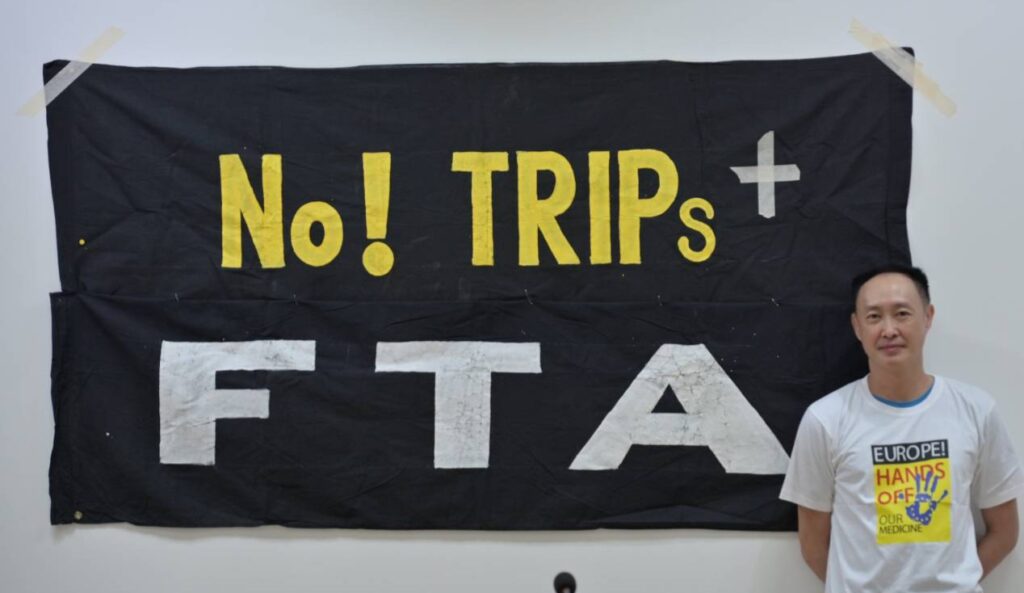
Chalermsak Kittitrakul, the Coordinator of FTA Watch, stated that the content of the Thailand – EU FTA negotiation has several sensitive and concerning issues, especially intellectual property (IP) and access to medicines. The EU demands IP protections stricter than the World Trade Organization’s TRIPs Agreement (TRIPs-plus provisions). This will have a serious impact on access to affordable medicines and the national health insurance system. If Thailand accepts the TRIPs-plus provisions, its national medicine expenses will increase by tens of billions of Baht per year. Competition from generic drugs will be hindered, forcing the use of expensive patented drugs.ทThe health insurance system will have to shoulder a higher budget burden for medicines and will be at risk of collapsing.
“The EU continues to propose that Thailand has to accept data exclusivity, patent term extensions (or Supplementary Protection Certificates: SPC), and IP enforcement measures. Even though it has adjusted the details of the proposed provisions, such as extending patent terms in case of delay in drug registration and market approval or for the patents on active pharmaceutical ingredients (APIs), the impact on access to medicines remains severe, and it is unacceptable. The EU should stop demanding any kinds of TRIPs-plus provisions, and Thailand negotiators should maintain their stance of not accepting TRIPs-plus rules, as they are doing in the FTA negotiation with the EFTA countries.
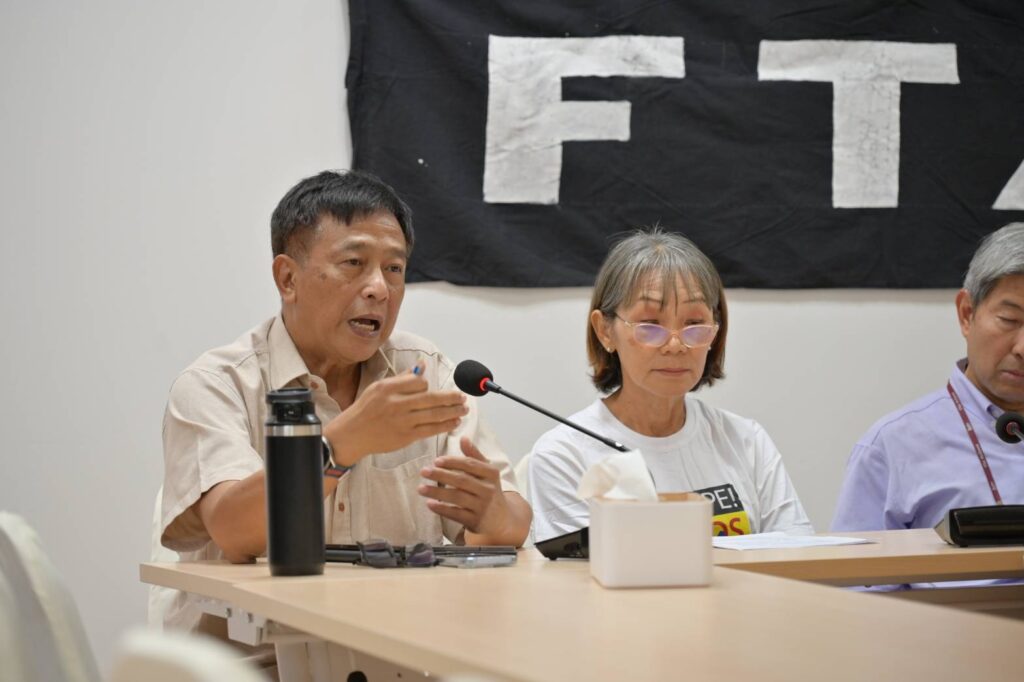
Nimit Tienudom, a CSO member of the National Health Security Board, mentioned that in the ongoing FTA negotiation, the EU has set conditions and demands that Thailand opens its government procurement market. Thailand has its Public Procurement and Supplies Administration Act to support the use of the locally produced medicines. The country also has the Thailand Research and Innovation Utilization Promotion Act to promote domestic R&D of innovations, including medicines, pharmaceutical supplies, and medical devices. If Thailand is forced to open the government procurement market, it will affect the country’s drug security in the long run because Thailand will have to abolish laws or policies that support the use of domestically produced drugs and promote medical and pharmaceutical R&D in country.
I must say that millions of people living with HIV in Thailand have been able to access the treatment at no cost under the health insurance system because of the anti-retroviral drugs produced in country. Thailand has a certain level of medicine security, which is very crucial, especially when it has a pandemic. The National Health Security Office (NHSO) has a policy on promoting domestic health innovations. Recently, the NHSO Board made the decision to add patient-specific titanium mesh implant, which is an innovation from the local technology R&D, to the UHC’s benefit package. But, if Thailand accepts the EU’s requirement to open market of the public procurement, Thailand will have to revoke laws and policies that support domestic industries, which will undermine local pharmaceutical production and the R&D capacity in country, as well as the national medicine security.
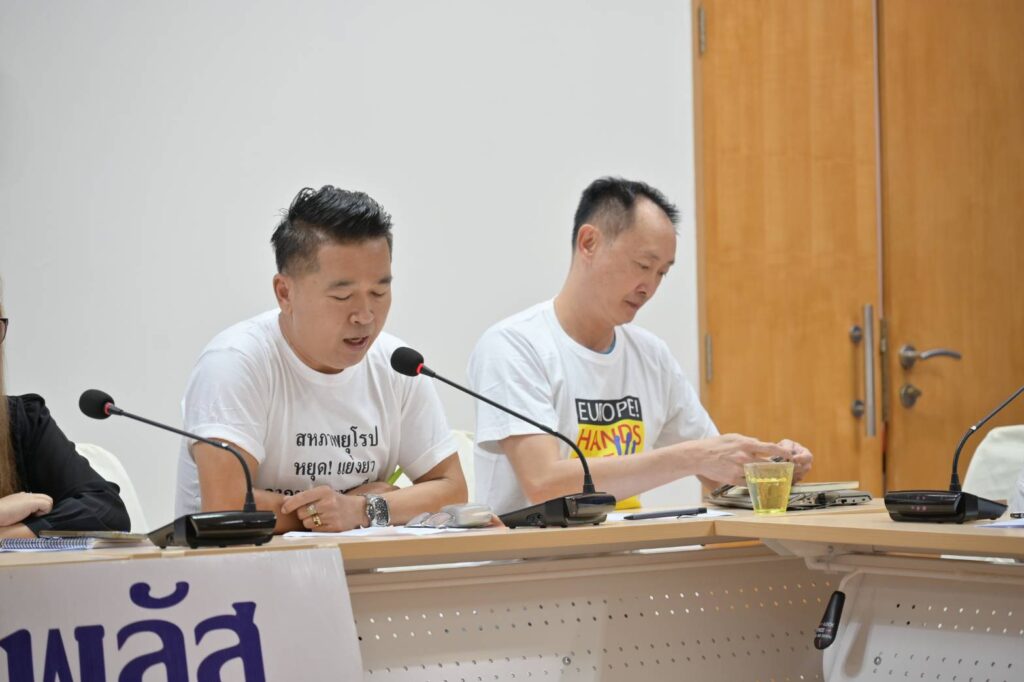
Apiwat Kwangkaew, Vice Chairperson of the Thai Network of People Living with HIV/AIDS, disagreed with the EU’s proposals, that require Thailand to accept TRIPs-plus conditions. He said, “The EU is acting like a hypocrite. During the COVID-19 pandemic, some EU countries enacted emergency laws to amend patent laws allowing them to ensure that their people were able to access vaccines and medicines. When the pandemic subsided, there was a proposal at the European Parliament to have a resolution to facilitate the use of compulsory licensing in pandemics. Despite the fact we have just gone through the COVID-19 crisis, the EU is imposing TRIPs-plus provisions on Thailand that will create patent barriers undermining Thai people’s access to medicines. While the EU government seeks to safeguard the health and lives of their own people, other governments need to do the same.
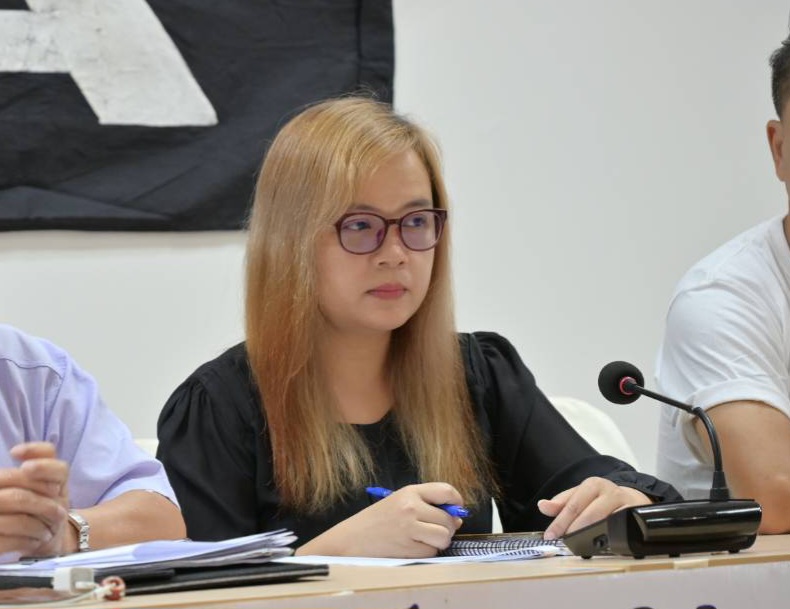
Monrudee Pho-in, an expert on food, drug, and health products at the Thailand Consumers Council, expressed her concern that Thailand may be forced to accept the import of re-manufactured medical devices from Europe. While Thailand doesn’t have adequate capacity to ensure and control safety and quality of these medical devices, it could cause patients to get incorrect or substandard diagnoses and treatments. In addition, Thailand may become a dumping ground for second-hand and non-durable medical devices from Europe and it becomes costly burdens for Thailand to dispose of the devices properly.
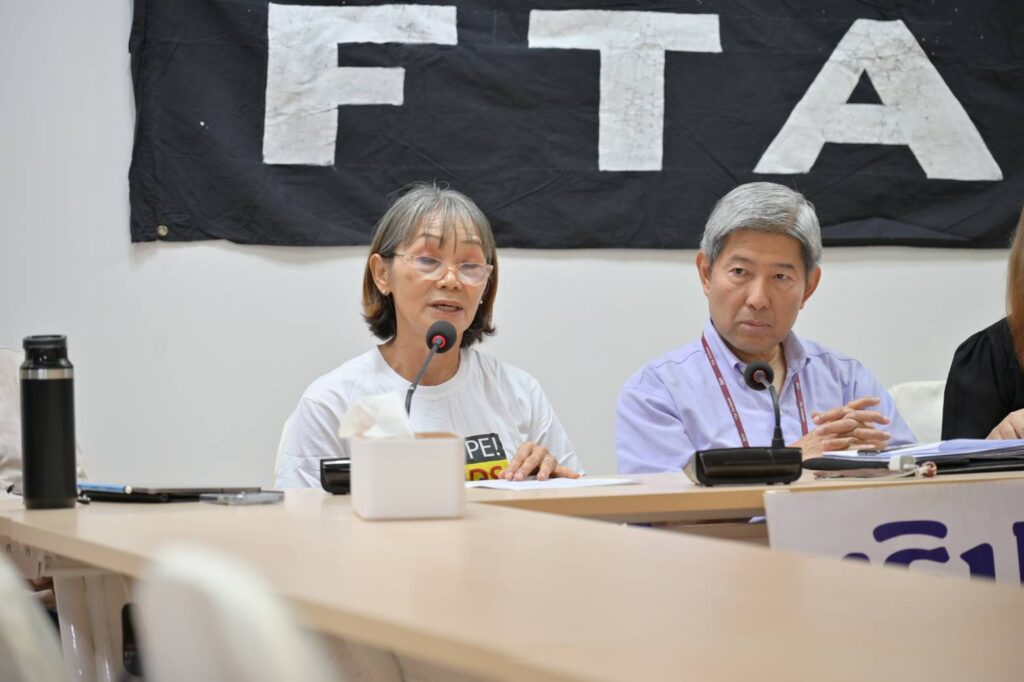
Nantawan Handee, from the Sustainable Agriculture Network, urged that Thai negotiators must refuse the EU’s proposal that forces Thailand to be a member of the UPOV 1991 Convention. She said, “UPOV 1991 is an international convention that has an aim to protect new plant varieties by granting absolute rights to plant breeders which mostly are giant agriculture corporations. A study of Thailand Development Research Institute suggests that Thailand should not be a member of UPOV 1991 at all because Thailand is considered a country rich in biodiversity. The report of the Special Commission of the Thailand Parliament on the CPTPP’s Impact Study indicates that being a member of UPOV 1991 is a very sensitive issue and has severe impact.
Nantawan mentioned that keeping seeds for re-planting is very vital for agricultural system and food security. Under UPOV 1991, it’s illegal and criminal if farmers keep seeds for re-planting. As a result, it encourages biopiracy and small local breeders are disappearing. Prices of seeds will increase by 2-6 times. Small-scale farmers will be severely affected, costs of food will increase, and the country’s food security will be under threats.
“The Alternative Agriculture Network strongly disagrees and opposes the Thailand – EU FTA negotiation, that imposes the requirement to be a member of UPOV 1991 Convention on Thailand and the effort, by the Department of Agriculture of Thailand, to amend the Plant Variety Protection Act B.E. 2542 to be complied with the UPOV 1991 Convention.”
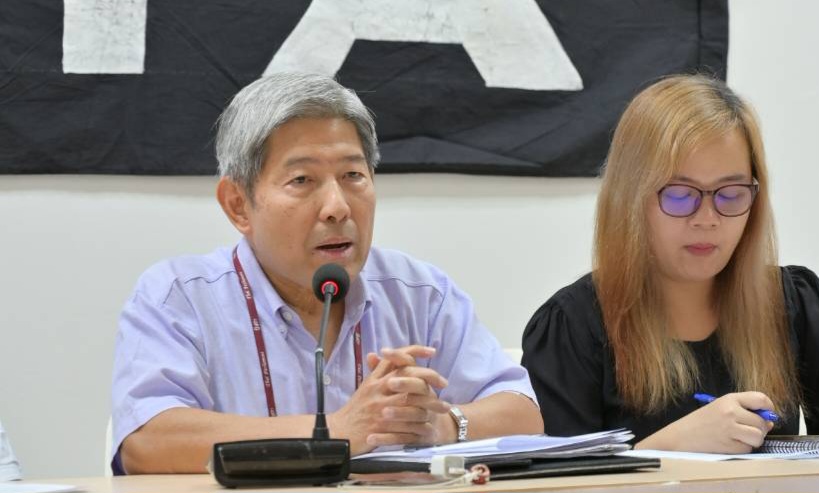
Prof. Dr. Nitath Sirichotirat, from the Thai Health Promotion Institute, National Health Foundation, believes that international trade should promote sustainable development. The Department of International Trade Negotiation, Ministry of Commerce, and the Thai negotiator team play a crucial role in driving sustainable economic development and preventing economic, social, and health inequities caused by the “commercial determinants of health”. The four products, including alcohol, tobacco, processed foods, and fossil fuels, are significant causes of economic, social, and health disparities. The United Nations has thus urged governments to adopt the principle of “the polluter pays”, as these four industries are major contributors to the global non-communicable disease epidemics and are responsible for 19 million deaths annually.
“We must not allow policy intervention and influence to persuade policymakers to favor the trade benefit over the public interest, which will cause severe damage to the economy, society and health through FTAs’ negotiations. Therefore, we need to negotiate very carefully to maintain the government’s policy space to protect the peoples.”
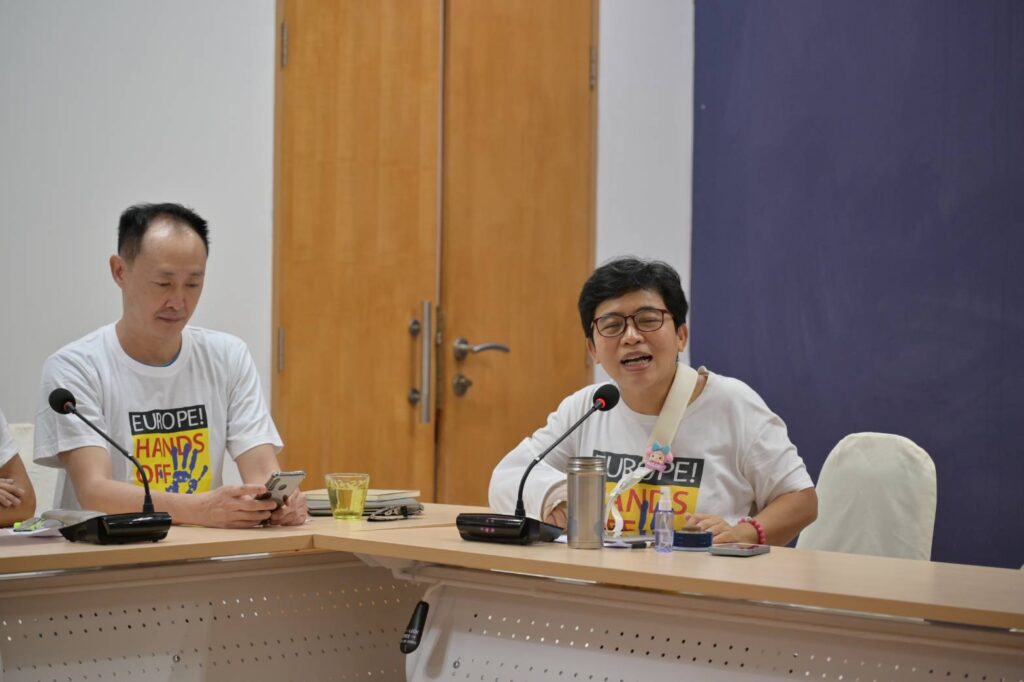
Kannika Kijtiwatchakul, the Vice Chairperson of FTA Watch, said that the EU is trying to publicize that this FTA will require the Thai government to sign the ILO Convention Number 87 and 98 on the Freedom of Association and the Right to Organize and the Right to Organize and Collective Bargaining to protect the rights of Thai and migrant workers.
“It is a good proposal and deserves support as it reaffirms fundamental rights for all workers in Thailand. However, if this FTA includes UPOV 1991, TRIPs-plus provisions, and other issues we have concerns about, it cannot be accepted absolutely. The Thai civil society has attempted to contact the EU delegations in Thailand, asking for a meeting with the Chief of the EU negotiator team to reiterate our concerns, as we did once when the European Parliament members visited Bangkok in December 2023. The Thai CSO group hasn’t received a response from the EU delegation yet.


